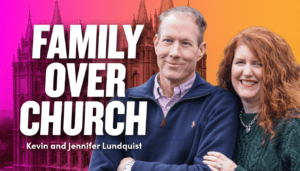As progressive and post-Mormons continue to leave the LDS church in increasing numbers, many former LDS church members miss the sense of community that they once enjoyed as active Mormons.
Oasis is a network of secular communities that meet weekly (on Sundays), organized according to the following values:


1) People are more important than beliefs.
2) Reality is known through reason.
3) Meaning comes from making a difference
4) Human hands solve human problems.
5) Be accepting and be accepted.
Currently the Oasis Network has two thriving communities:
Houston Oasis: https://houstonoasis.org
Kansas City Oasis: https://KCoasis.org
Also, a new Oasis community is under development in Boston: https://bostonoasis.org.
In this episode we interview the two founders of Oasis: Mike Aus of Oasis Houston, and Helen Stringer of Oasis Kansas City.




13 Responses
If religion and God are not important (or necessary truths), then why do secularists always need to replace them with something?
Because community, morality, family, service and other such things are still hugely important to us.
Won’t you eventually just end up with another organization with leaders who some may disagree with, get digruntled, and leave? Seems to me that there are plenty of social clubs you can join already out there and these types are trying to basically become “church”.
People might leave, but that is the beauty of the secular community. If you leave, you can do so with your integrity intact. Secular groups may differ on many things, but what they respect is, free inquiry, open mindedness, and the pursuit of ideas that lead to healthy communities, morality, family support and quality service.
NO, NO, NO!!! People must be required to stay thru coercion, intimidation, threats, and fear with excommunication, disfellowship, shunning and opprobrium as the goads. Sheesh. I have to explain these things to you?
I have wondered this, too. Why not join up with the Lions’ Club or the League of Women Voters or whatever civic or charity-minded group is out there? Why create something whose identity is principally that it is an alternative to churches?
That’s a fair question. That said, I think that this is how human creativity works. We have an experience with something, then we try to tweak it and make it better. See here to see what I mean. https://vimeo.com/139094998 In some sense, everything is remix. And Joseph Smith was perhaps the greatest remixer of our era (in my opinion).
Mansfield asks: “Why not join up with the Lions’ Club or the League of Women Voters or whatever civic or charity-minded group is out there?”
None of these organizations fits the needs of particular individuals or families–especially families with kids. What Oasis and other groups are doing is using the positive qualities of the waning church model and creating community around the enrichment of individual and family life. Seems to me to be a legitimate, and increasingly necessary, endeavor.
I disagree. I argue, instead, that the most effective deception of churches is that families need institutions focused on “family” and “community” to support them. As humans are incentivized by family and community relationships, church institutions are able to wield more control over individuals who accept this deception.
This type of secular community perpetuates the deception and removes God.
Unnecessary, superfluous, dangerous.
Time to move on.
I hope communities like these continue to develop in Utah! I would definitely bring my family to them.
At the heart of mormon church attendance is an irrational fear of death, coupled with the promise of eternal life. Absent that fear, few are likely to feel driven to attend such insanely dull meetings. Good speakers would be a key component for the success of an oasis style community.
Very interesting interview. I like the idea of being able to attend something and give it a try, that you already know you could walk away from without losing anything. Any San Fernando Valley, CA (or Los Angeles area) Oasis rumblings yet?
I also like the idea that the talks and community moments (as appropriate) are posted online for everyone’s benefit. (Running camcorders is not a part of the Sunday Mormon experience — indeed: no cameras allowed in the chapel… although now that everyone has smartphones (a development since I have attended such meetings) how does that play out since everyone has one in their pocket/purse?)
BTW for the haters — no one is making anyone attend! Calling Oasis an atheist church is like calling TED an atheist church, or YouTube an atheist church — it’s just a (local) venue for sharing ideas and having conversations and getting to know people. Humans have been doing this for ages. Pretty ancient stuff. And not requiring people to sign up for a belief system is a really nice change, for people who miss the community but want nothing of the dogmatic burden. More power to you, Mike and Helen (and John).
Mike or Helen mentioned an Oasis presence in San Antonio during the podcast, but I can’t find anything about a San Antonio community on their website. Does anyone have more information?